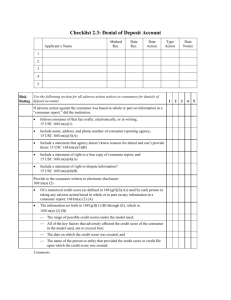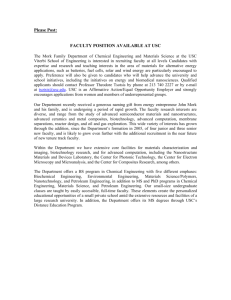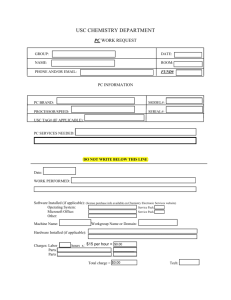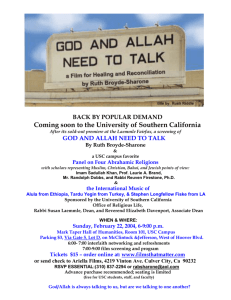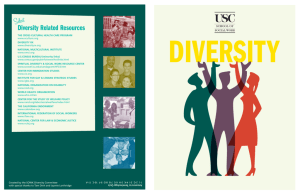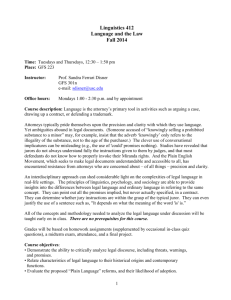568T Syllabus Fall 2015 Class(2)onBB-3
advertisement
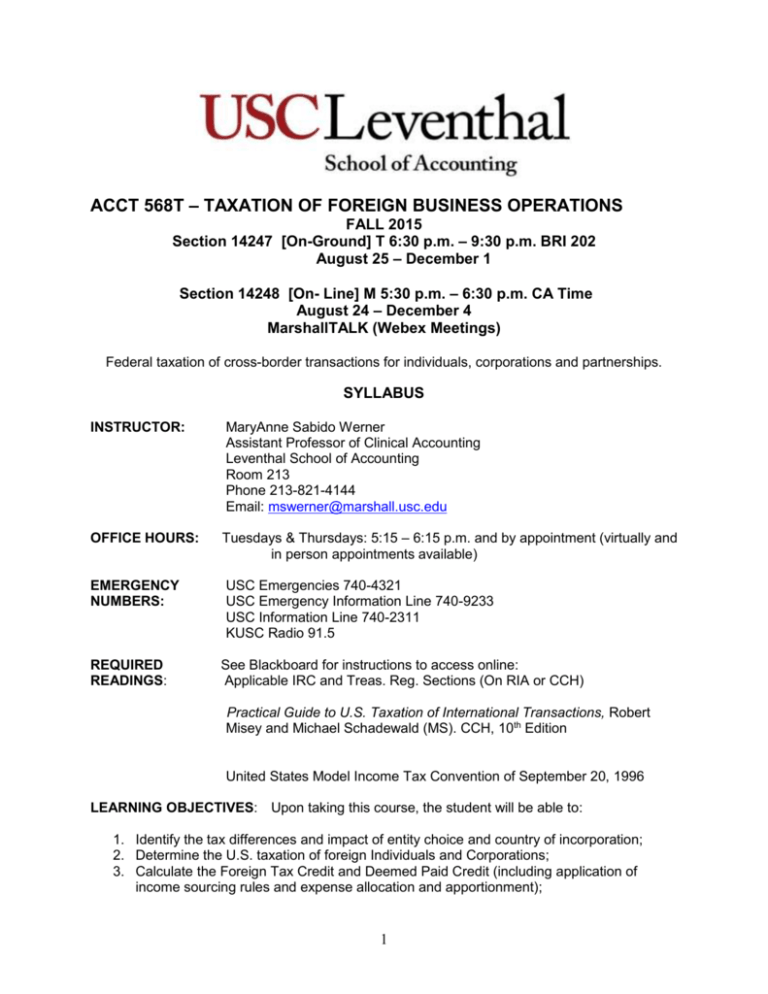
ACCT 568T – TAXATION OF FOREIGN BUSINESS OPERATIONS FALL 2015 Section 14247 [On-Ground] T 6:30 p.m. – 9:30 p.m. BRI 202 August 25 – December 1 Section 14248 [On- Line] M 5:30 p.m. – 6:30 p.m. CA Time August 24 – December 4 MarshallTALK (Webex Meetings) Federal taxation of cross-border transactions for individuals, corporations and partnerships. SYLLABUS INSTRUCTOR: MaryAnne Sabido Werner Assistant Professor of Clinical Accounting Leventhal School of Accounting Room 213 Phone 213-821-4144 Email: mswerner@marshall.usc.edu OFFICE HOURS: Tuesdays & Thursdays: 5:15 – 6:15 p.m. and by appointment (virtually and in person appointments available) EMERGENCY NUMBERS: USC Emergencies 740-4321 USC Emergency Information Line 740-9233 USC Information Line 740-2311 KUSC Radio 91.5 REQUIRED READINGS: See Blackboard for instructions to access online: Applicable IRC and Treas. Reg. Sections (On RIA or CCH) Practical Guide to U.S. Taxation of International Transactions, Robert Misey and Michael Schadewald (MS). CCH, 10th Edition United States Model Income Tax Convention of September 20, 1996 LEARNING OBJECTIVES: Upon taking this course, the student will be able to: 1. Identify the tax differences and impact of entity choice and country of incorporation; 2. Determine the U.S. taxation of foreign Individuals and Corporations; 3. Calculate the Foreign Tax Credit and Deemed Paid Credit (including application of income sourcing rules and expense allocation and apportionment); 1 4. Apply the knowledge learned to analyze the applicability and scope of income tax treaties; and 5. Identify any Subpart F income and other income subject to other anti-deferral provisions of the Internal Revenue Code. PROGRAM LEARNING OUTCOMES: The following are the five Student Learning Outcomes developed for this program by the USC Leventhal faculty and administration and filed with the AACSB, the accrediting body for accounting and business schools. This course will deal primarily with learning outcomes #1, #3, and #5. 1. Technical, Conceptual, Problem-Solving Students will be competent in and be able to apply discipline-specific knowledge and skills in the fields of accounting or taxation. This learning outcome includes the development of critical thinking and problem-solving skills, as well as an understanding of the strategic role of accounting and taxation in business organizations and society. MBT specific—Apply critical thinking and problem-solving skills related to taxation of individuals, flow-through entities, and corporations. Recognize potential opportunities for tax savings and tax planning. 2. Professional Development Students will be able to communicate clearly and strategically, after considering the relevant audience, situation, and purpose of the communication. Students will demonstrate the ability to work productively with others to accomplish established goals. MBT specific—Convert complex and technical tax terminology into language that translates to non-technical audiences. Demonstrate strong interpersonal communication skills that build relationships with clients over time. Document exchanges with careful attention to word choice, tone, and accuracy. 3. Research/Life-Long Learning Students will be able to use relevant research databases and academic/professional literature to gain new knowledge and analyze business situations. MBT specific—Use computer-based and paper-based systems to thoroughly research tax codes, tax law, rulings and interpretations. Use knowledge to be able to adjust to changes in tax law over time. 4. Ethical Principles and Professional Standards Students will be able to apply ethical principles and professional standards in analyzing situations and making informed decisions. MBT specific—Demonstrate understanding of and apply consistently the ethical principles and professional standards related to the profession. Show the ability to express and follow rules of independence and the highest sense of professional ethics. 5. Globalization and Diversity Students will be able to demonstrate an international perspective and appreciation for diversity and cultural differences, along with their significance in global business. MBT specific—Explain taxing policies related to foreign business operations of US individuals/corporations and US business operations of foreign individuals/corporations. 2 For online students only MARSHALL SCHOOL OF BUSINESS ONLINE LEARNING PLATFORM Weekly activities may include reading assignments, pre-recorded lectures, homework assignments,and weekly MarshallTALK live video discussion sessions. It is estimated that students will spend approximately 9 hours per week outside of the classroom to complete each week’s materials in a 3-unit course. New students are encouraged to participate in the Orientation Week activities in order to learn how to use the online tools available to them before the official start of class. Our online courses follow a “flipped classroom” model in which students are required to complete all of the reading assignments, pre-recorded lectures, and Bb assignments at their own pace (i.e.asynchronously) prior to attending the “real time” (i.e. synchronous) MarshallTALK video discussion forum, where they will interact with one another and with faculty to apply the concepts they’ve learned throughout the week. Students are required to complete all asynchronous online content activities as well as to participate in the synchronous MarshallTALK live video discussion sessions each week. Check the course syllabus for dates and times and only register for this class if you can complete all class work independently and log on to the weekly interactive MarshallTALK sessions. Blackboard (Bb) Blackboard is the primary learning management system currently used at USC and may be accessed at https://blackboard.usc.edu. From the Bb Course Home Page, students can access their course syllabus, identify readings, submit assignments, and review grades. They can also access links to the other platforms used in this course. General questions regarding course material, content, or procedures should be addressed during MarshallTALK sessions so that faculty responses may benefit all class members. Pre-Recorded Lectures The Pre-recorded lectures enables students to asynchronously view faculty lectures, classroom discussions and other integrated course content. The Pre-Recorded lectures are organized into weekly sessions that correspond to the course syllabus and are designed to be taken in the order they appear. MarshallTALK Students and faculty will meet online in real time at a pre-determined date and time each week in MarshallTALK, a live video discussion forum. MarshallTALK allows students to apply the content they have learned thus far in the course with their peers and to ask questions of faculty face-toface. A link to this platform will be found in Bb. Readings should be done in advance of MarshallTALK sessions. Links to join the weekly MarshallTALK sessions will be posted in Blackboard. This is your opportunity to have live discussions with your professor and classmates. Participating in these sessions is not optional; rather, it is required to meet the minimum number of contact hours for this course. Students who miss the live sessions consistently or frequently will not be allowed to pass the course. 3 SYSTEM REQUIREMENTS The following equipment is required to successfully participate in this online course: • Computer • Headset or built-in speakers & microphone • HD Webcam NOTE: Students using MacBook Pro and MacBook Air computers with retina display may need to use an external webcam in order to fully participate in the MarshallTALK sessions (powered by WebEx). • High speed Internet connection Students must be able to access at least one of the following browsers: • Internet Explorer 9.x and above on PCs • FireFox 3.6 and above on PCs • Safari 3.6 and higher on Mac (only) • Firefox 3.x and higher on Mac • Google Chrome TECHNICAL SUPPORT • For Blackboard Support: USC Information Technology Services: Call (213) 740-5555 or email consult@usc.edu. For more information, visit their website at: http://www.usc.edu/its/ • For Virtual Classroom Support: Email marshall.talk@marshall.usc.edu • For MarshallTALK (WebEx) Support: Go to: http://www.webex.com/test-meeting.html • For MyMarshall Support, USC Marshall: Call (213) 740-3000 Monday through Friday, 7:00am to 6:00pm PST or visit their website at: http://msbhelp.usc.edu • For additional campus-based computer support: o USC Information Technology Services (ITS) Customer Support Center http://itservices.usc.edu/csc/ o For Computer Repairs: USC Bookstore Service Department http://uscbookstore.com/t6-computer_repair.aspx 4 GRADING: QUIZZES MIDTERM EXAM FINAL EXAMINATION HOMEWORK & PARTICIPATION (Marshall TALK for online) RESEARCH CASE TOTAL POINTS 150 250 300 150 150 1,000 GRADING STANDARDS: We adhere to the USC Leventhal School of Accounting and Marshall School of Business grading standards for graduate programs. In general, final course grades at the graduate level in a core course average approximately B+ (3.3), but may vary based on class performance. For elective courses, the class average is usually higher--approximating 3.5, which is between a B+ and an A-. You must receive a C or better to pass a required class, and you must have an overall B average (3.0 minimum) in order to graduate from USC. . The graded elements of this course are listed in this syllabus along with information about how they will be evaluated. CLASSROOM AND GRADING POLICIES: 1. Class attendance and participation is important in developing a coherent view of the materials covered in the course. Students should be prepared to discuss the materials assigned for each class. Lack of preparedness will impact your homework and participation grade. 2. Homework problems will be posted in blackboard for the topic discussed. Students should be prepared to present answers to the homework problems, which will be presented and discussed at the beginning of the class session following the lecture on that topic. [For online class, homework will be presented during the MarshallTALK (Webex meeting) Monday after the ground class]. Homework problems will not be collected, but your homework and participation grade is based on advance preparation of the problems and effective presentation when called upon. 3. Four quizzes (similar to the homework problems) will be given during the course, as indicated on the syllabus. Quizzes will be taken online through Blackboard. The instructions and the quizzes can be found under Blackboard’s “Assignments” tab. Quizzes will be discussed in class immediately after they are due, and must be completed prior to the class discussion to receive credit for the quiz. 4. Both examinations will be “open book” (Code, Regs, slides, notes, and assigned readings). Both classes will take the examination at the same time. The ground class will take the exam in the classroom. The online class will take the examination in Blackboard. Instructions will be posted. 5. The research paper will be evaluated based on content as well as on the effectiveness of your communication. This includes grammar, spelling, organization, and other essentials of effective writing. The topic will be posted in Blackboard. 5 6. The class lecture will be recorded and posted on Blackboard. For “on ground students”, the recordings are for study purposes only and are not a substitute for class attendance. 7. Attendance in all classes is expected and missed class attendance will result in lower class participation grade. 8. Make up examinations will generally not be given, except in the case of a documented medical problem. All students must take the final exam as scheduled unless an incomplete contract has been previously approved according to Leventhal School of Accounting rules. ACADEMIC CONDUCT Students enrolled in any class offered by the Leventhal School of Accounting are expected to uphold and adhere to the standards of academic integrity established by the Leventhal School of Accounting Student Honor Code. Students are responsible for obtaining, reading, and understanding the Honor Code System handbook. Students who are found to have violated the Code will be subject to disciplinary action as described in the handbook. For more specific information, please refer to the Student Honor Code System handbook, available in class or from the receptionist in ACC 101. PLAGIARISM Plagiarism – presenting someone else’s ideas as your own, either verbatim or recast in your own words – is a serious academic offense with serious consequences. Please familiarize yourself with the discussion of plagiarism in SCampus in Section 11, Behavior Violating University Standards https://scampus.usc.edu/1100-behaviorviolating-university-standards-and-appropriate-sanctions/. Other forms of academic dishonesty are equally unacceptable. See additional information in SCampus and university policies on scientific misconduct,http://policy.usc.edu/scientific-misconduct/. SUPPORT SYSTEMS A number of USC’s schools provide support for students who need help with scholarly writing. Check with your advisor or program staff to find out more. Students whose primary language is not English should check with the American Language Institute http://dornsife.usc.edu/ali, which sponsors courses and workshops specifically for international graduate students. The Office of Disability Services and Programs http://sait.usc.edu/academicsupport/centerprograms/dsp/home_index.html provides certification for students with disabilities and helps arrange the relevant accommodations. If an officially declared emergency makes travel to campus infeasible, USC Emergency Information http://emergency.usc.edu/ will provide safety and other updates, including ways in which instruction will be continued by means of blackboard, teleconferencing, and other technology. 6 Discrimination, sexual assault, and harassment are not tolerated by the university. You are encouraged to report any incidents to the Office of Equity and Diversity http://equity.usc.edu/or to the Department of Public Safety http://capsnet.usc.edu/department/department-public-safety/onlineforms/contact-us. This is important for the safety whole USC community. Another member of the university community – such as a friend, classmate, advisor, or faculty member – can help initiate the report, or can initiate the report on behalf of another person. The Center for Women and Men http://www.usc.edu/studentaffairs/cwm/ provides 24/7 confidential support, and the sexual assault resource center webpage sarc@usc.edu describes reporting options and other resources. STATEMENT ON RETENTION OF PAPERS FROM THE CURRICULUM OFFICE According to the Guidelines on Documents Retention, University policy requires that final exams and all other grade work which affected the course grade be kept for one year. Other papers or work that instructors hand back but that students fail to pick up can be held for one month. 7 SCHEDULE – ACCT 568T – FALL 2015 Class ONLINE 1 Dates Aug 24 Aug 25 for ground class Topic / Assignment SUBMIT On-Line ONLY- Introduction to Class TOPIC 1: Introduction / Double Taxation and Foreign Tax Credit Overview Text Chapter 1 2 Aug 31 for online class Sept 1 for ground class Sept 14 for online class 3 Sept 8 for ground class Sept 14 for online class 4 TOPIC 2: Foreign earned income exclusion for citizens and residents aliens employed abroad/ Foreign Tax Credit Individual/ Choice of Entity and country Text Chapter 2 & 8 Code: §911 ***PRESENT POSTED HOMEWORK PROBLEMS TOPIC 1 & 2*** TOPIC 3: Foreign Tax Credit Overview – Corporation/ Indirect and Direct Credit /Source of Income Text Chapter 3 Code: §§ 901, 902, 78, 861 – 863, 865 Regs: §§ 1.901, 1.902, 1.863-3 Other: Form 1120, pgs 1-4 Form 1118 Sept 15 ***PRESENT POSTED HOMEWORK PROBLEMS TOPIC for ground 3*** class TOPIC 4: Source of Income continued/Allocation and Sept 21 Apportionment of Expenses for online class Text Chapter 3 Code: §864 Regs: §§ 1.861-8, 8T, 9T(a)-(g), 10T(e), 11, 11T, 12T(c), 17 QUIZ #1 on Topics 3 & 4 DUE MIDNIGHT: Sept 20 for ground class Sept 27 for online class 8 5 Sept 22 ***PRESENT POSTED HOMEWORK PROBLEMS TOPIC for ground 4*** class Review Quiz # 1 Sept 28 for online class TOPIC 5: Allocation and Apportionment of Expenses/Foreign Tax Credit – Corporation Text Chapter 3 and 4 Code: §§ Same as above and 902 Regs: §§ Same as above 6 7 Sept 29 ***PRESENT POSTED HOMEWORK PROBLEMS TOPIC for ground 5*** class Review Quiz # 2 Oct 5 for online class TOPIC 6: Foreign Tax Credit - Limitation Oct 6 for ground class ***PRESENT POSTED HOMEWORK PROBLEMS TOPIC 6*** Oct 12 for online class 8 9 Text Chapter 4 Code: §§ 904 Regs: §§ 1.904-1 TOPIC: Foreign Tax Credit Problems/Review Be prepared to present answers to posted review problems October 13 for ground class & online class MIDTERM EXAM – October 20 for ground class TOPIC 7: Currency translation; earnings and profits Both classes will take the examination at the same time. The ground class will take the exam in the classroom. The online class will take the examination in Blackboard Tax Treaties/Dual Consolidated Losses 9 QUIZ #2 on Topic 5 DUE MIDNIGHT: Sept 28 for ground class October 4 for on-line class October 26 for online class 10 Oct 27 for ground class Nov 2 for online class 11 Nov 3 for ground class Nov 9 for on-line class 11 Nov 10 for ground class Nov 16 for online class Text Chapter: 6, 12, and 13 Code and Regs Section 312 Treas Reg 1.964-1T, Section 985 -988 United States of Model Income Tax Convention of September 20, 1996 ***PRESENT POSTED HOMEWORK PROBLEMS TOPIC 7*** TOPIC 8: Controlled Foreign Corp/Subpart F Income/956/PFIC Text Chapter 5 Code: §§ 951, 954, 956-958 Regs: §§ 1.951, 954, 956 - 958 ***PRESENT POSTED HOMEWORK PROBLEMS TOPIC 8*** TOPIC 9: Subpart F continued/Allocation of Income and Deductions/ Transfer Pricing Text Chapter 5 and 13 Code: Same as above Regs: Same as above ***PRESENT POSTED HOMEWORK PROBLEMS TOPIC 9*** TOPIC 10: Taxation of Foreign Taxpayers (Individual and Corporate) Text Chapter 9 Code: §§ 864(b)(c) Regs: §§ 1.864 QUIZ # 3 on Topics 8 & 9 DUE MIDNIGHT: Nov 10 for ground class Nov 16 for online class 12 Nov 17 for ground class ***PRESENT POSTED HOMEWORK PROBLEMS TOPIC 10*** Review Quiz # 3 Nov 23 for online class TOPIC 11: Firpta/Branch Level Taxes Text Chapter 10 Code: §§ 897, 884 Regs: §§ 1.897, 884 10 13 Nov 24 for ground class Review Quiz #4 Topic 12: Formation, Reorganization and Disposition of Foreign corporations/ Post Mid-Term Review Nov 30 for online class Text Chapter 14 QUIZ # 4 on Topic 11 DUE MIDNIGHT: Nov 24 for ground class December 6 for on-line class 14 Dec 1 for ground class Topic 13: International Tax Practice and Procedure Text Chapter 16 Dec 7 for online class 15 Dec 8 for ground class Review 16 Dec 15 FINAL EXAM (In Class) Both classes will take the examination at the same time, The ground class will take the exam in the classroom The online class will take the exam in Blackboard 11 Research Case DUE MIDNIGHT DEC 1
